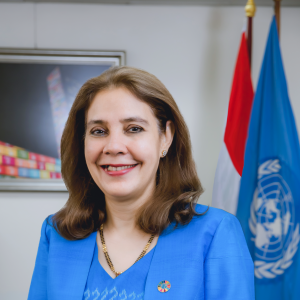National SDGs Annual Conference, Resident Coordinator's Speech, Gita Sabharwal
-----
National SDGs Conference
Your Excellencies, Indonesia has shown exemplary progress on the SDGs with six out of ten indicators on track. This is well above the regional and global average and speaks to your commitment and leadership.
The country is set to capitalize on this momentum through comprehensive social, economic and governance transformation in support of the national agenda to become a developed nation in two decades from now.
The Pact of the Future, signed by Member States, including Indonesia, recently in New York, sets out the roadmap for this.
The Pact highlights three priority areas in the context of more robust multilateralism: young people, technologies and SDGs.
All three strategically come together in Indonesia, which has a booming start-up landscape, a youth demographic dividend, and robust SDG progress, which allows for its achieved by 2030.
This can position Indonesia as a dominant player on the global stage.
From the perspective of the UN, the partnership with Indonesia will prioritise four key approaches while leveraging a whole of government, whole of society and whole of UN approach.
One, South-South Triangular Cooperation provides the framework for Indonesia to share its development successes with the global south to accelerate SDGs.
These successes include the green transition, technological transformations and innovative SDG financing.
They are critical for the global south, where partnerships are key to make development gains and participate equitably in worldwide supply chains.
The Asia-Africa forum offers the avenue for such partnerships, which will celebrate its 70th anniversary next year.
Two, turbo-charging the SDGs will require blended and innovative financing to fill financing gaps.
Indonesia is a leader in both, and the global south is looking to you on approaches and instruments to mobilise capital from the private and financial markets.
Among sources of additional financing are sovereign and corporate SDG bonds, which were leveraged for the issuance of over $10 billion towards investments in education, healthcare, and the blue and green economy.
The UN Principles of Responsible Banking are creating entry points for supporting domestic banks to put in place frameworks for transitional financing targeted at ESG investments. Every percentage point shift towards ESG investments unlocks close to $1.2 billion to accelerate the SDGs.
Similarly, the partnership with sustainable energy for all connects potential investors and domestic stakeholders to accelerate renewable investments in country.
Indonesia also leverages Islamic Finance, including Zakat contributions and waqf assets, which are valued at $27 billion. They are being invested in transformative initiatives at the community in support of social welfare aligned with the SDGs.
Three, scaling up innovations for green technologies will be key to reducing emissions in the energy, industry and waste sectors to achieve the government’s net zero targets.
We are seeing increasing demand from industrial parks across Indonesia to align with international eco-standards by introducing best available technologies and environment practices.
The partnership reaches more than 3,000 factories to reduce emissions, save energy, cut back water use and boost renewables, which collectively supports the mitigation of GHGs by just over 7%.
The private sector is critical for this transformation.
Experience tells us that when best available technologies are introduced, the private sector scales them up on its own in a quick win for bottom lines and the reducing their carbon footprint.
One targeted area of our partnership for an accelerated green transition is the critical mineral down streaming industry in support of circularity across the value chain.
Four, for the first time Member States have acknowledged the power of sports for SDG acceleration as laid out in the Pact of the Future.
Action 11 specifically speaks to “protect and promote culture and sport as integral components of sustainable development.”
In Indonesia, football is the most popular sport and can play a large role in this.
I have seen the transformative power of football first-hand in my dialogue with young players and their coaches at Bali United, Persebaya Surabaya and PSM Makassar.
In partnership with the PSSI we need to leverage the drive of these young players and other sporting role models to champion the SDGs. They could contribute greatly by promoting active lifestyles, healthy habits, and gender equality.
Your Excellencies, the UN is only as effective as its partnerships.
The partnership with the Government is our biggest asset.
It is your forward-looking development vision that the UN aligns to by bringing to bear cutting edge global expertise and science backed technical assistance to position Indonesia as a development leader on the global stage.
Terima kasih
Speech by


















